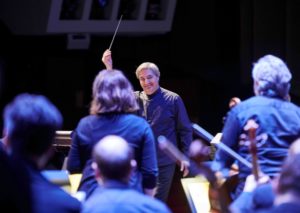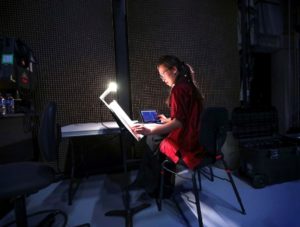 Orchestras Canada’s member orchestras range in size from fully professional ensembles, to smaller regional orchestras, to community groups working with enthusiastic amateur musicians. The Music4Life String Orchestra is one such community group. Based in Ajax, Ontario. Music4Life’s orchestra currently has over 30 string musicians, including four professional section leads who act as mentors and teachers to the rest of the ensemble. The orchestra members range in age from 8 to 78 years old, making for an unusual but beneficial social and musical experience for all involved.
Orchestras Canada’s member orchestras range in size from fully professional ensembles, to smaller regional orchestras, to community groups working with enthusiastic amateur musicians. The Music4Life String Orchestra is one such community group. Based in Ajax, Ontario. Music4Life’s orchestra currently has over 30 string musicians, including four professional section leads who act as mentors and teachers to the rest of the ensemble. The orchestra members range in age from 8 to 78 years old, making for an unusual but beneficial social and musical experience for all involved.
Many community orchestras have professional musicians among their ranks. The extent of their participation varies, from having only a professional concertmaster, to having five professional principal strings, to engaging professional principal musicians in all sections to work alongside community musicians. While Music4Life’s employing a professional conductor and musicians in itself is not unusual, the way in which it is framed is. The orchestra uses the side-by-side professional/amateur experience and in-rehearsal teaching as a particular point of interest to current and prospective community musicians.
The community musicians benefit from having a professional conductor and section leaders present throughout the rehearsal and performance process. Although some of these musicians have private teachers, for many, orchestra rehearsal is the only chance they have for further instruction on their instrument. Seating is rotated at each rehearsal so that each musician gets a chance to sit next to their section leader, and break times are viewed as opportunities for further informal and social exchanges between professional and amateur musicians. The Music4Life arrangement provides an excellent collaborative and supportive environment for all and is a complement to traditional private lessons.
For the professional musicians, this is an opportunity to share their musical knowledge and to reach a wider number of musicians in the community. The group’s professional and advanced musicians are given opportunities to play paid gigs in string quartet/quintet arrangements for public and private events. Proceeds raised from these performances are directed back into the operation of the non-profit orchestra. The side-by-side nature of the Music4Life String Orchestra is one that supports exchange between professional and amateur, and young and old, in a way that benefits the musical experience of all involved.
Music4Life’s next concert is on December 7th at Forest Brook Community Church. Under the musical direction of Kathryn Knowles, a Toronto-based Cellist, Composer and General Manager of the Canadian League of Composers, the event will feature a collaboration with a string quartet of award-winning jazz/classical crossover musicians who will perform seasonal, classical and jazz repertoire with the orchestra. Learn more about the Music4Life String Orchestra on their website.




 Musicians from the Windsor Symphony Orchestra visited community and health venues between October 1st and 10th as part of their Music for Health outreach program. Last year this program included 21 performances to more than 1200 seniors in and around Windsor.
Musicians from the Windsor Symphony Orchestra visited community and health venues between October 1st and 10th as part of their Music for Health outreach program. Last year this program included 21 performances to more than 1200 seniors in and around Windsor.